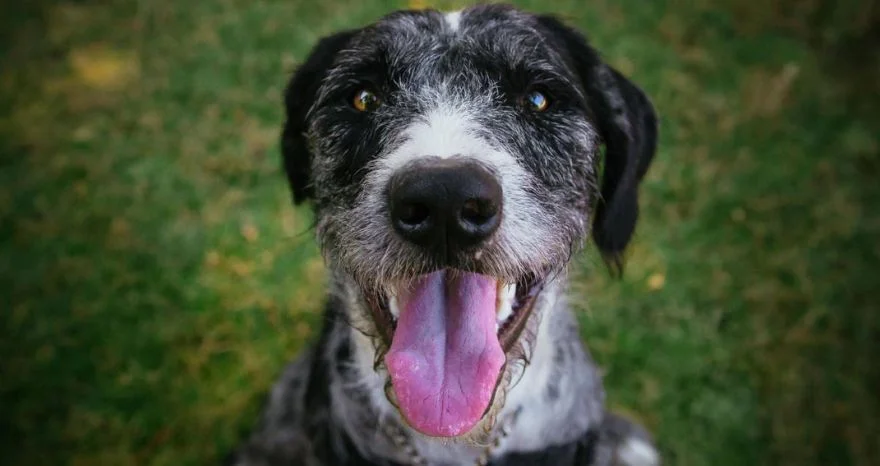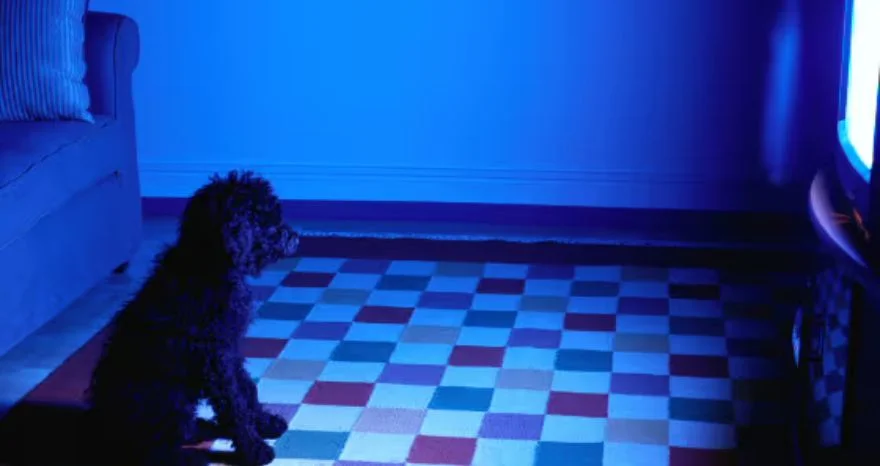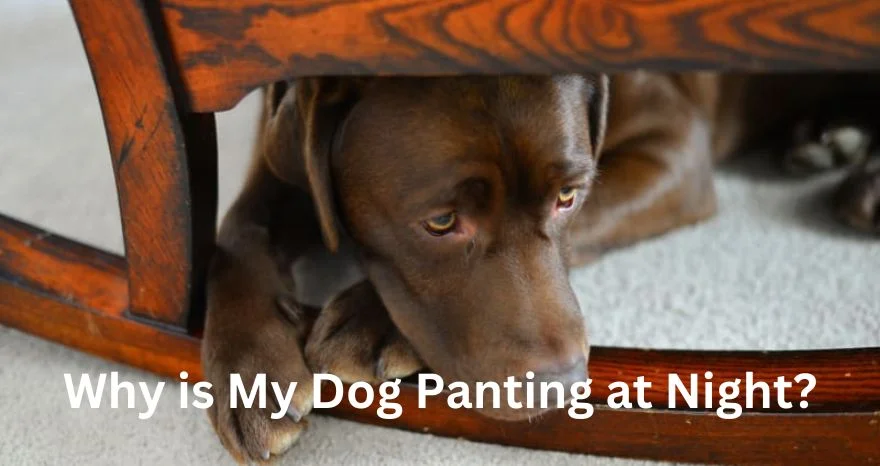Dogs are very different from humans. If you are the parent of a pet, it is essential to learn what is normal and not. But in recent times, many people asked me “why is my dog panting at night.” And today, I am here with their answers.
Shortness of breath for dogs is entirely usual. It is as natural to dogs as sweating is to humans. A dog may breathe for various reasons, aroused, incredibly hot, or even during exercise to regulate its body temperature.
Usually, we expect our furry friends to pant on a hot sunny day or during exercise. But the fact that it is panting or breathes all night heavily is slightly different from how a dog breathes heavily during the day.
If night pacing and panting interfere with your dog’s sleep, he may feel that something is wrong with him. This can be a real problem for dog owners, as sleepless nights are a good indicator of something terrible.
Difference between Normal and Abnormal Dog Panting
It is a good idea to measure your dog’s breathing when he is resting and after training to find out what is normal for him.
This way, you can tell if your dog is breathing too much. Dogs usually breathe 15-20 times a minute. Anything between 35 and 40 breaths per minute at rest is considered abnormal.
Again, is your dog lethargic or eating poorly? Are they coughing?
These symptoms are elements that help distinguish normal from abnormal shortness of breath. Moreover, the dog’s breathing seems to be too tight or difficult.
Similarly, if it is very hot or if your dog is just active with panting, you can consider this as abnormal. Indeed, these signs will help you and your veterinarian diagnose the cause of your dog’s shortness of breath.
Why do dog paint?
The most common reason for canines’ panting is to adjust their temperature. Usually, pups have high temperatures than humankind, so they are more inclined to over-heating.
Shortness of breath also indicates that the dog is tired from prolonged play or exercise. Just like people pant, shortness of breath helps canines breathe and get their breathing back to normal.
Excessive shortness of breath can sometimes be associated with anxiety or restlessness. It could be that your dog is uncomfortable, either because of something that annoys him or because of something he is afraid of.
The reasons why is my dog panting at night
Excessive shortness of breath in dogs at night when they are not very active is one of the best indicators that something is wrong with your dog.
Anyway, are you looking for “why is my dog panting and restless at night?” there could be several different reasons for this.
New environment or change of life
Dogs are a lot like humans when it comes to stress. Significant changes in your environment or life will shock your pet. The dog is essentially forced to make substantial changes in its life.
Respiratory problems
Some breathing problems can cause your dog to pant at night and during the day. For example, your pet may have pneumonia. This condition causes inflammation, high fever, weakness, coughing, shortness of breath, etc.
Cushing’s disease
When there is too much cortisol in the bloodstream, Cushing’s syndrome occurs. This is also one of the reasons a dog can pant.
Fear or Anxiety
One of the main reasons dogs get nervous and scared at night is fear. If you think your dog may be having trouble at night due to anxiety, several root causes of stress may be responsible.
Sunstroke
This can become a serious problem and even lead to death if left untreated. Heatstroke or overheating may cause severe shortness of breath in pups, leading to dehydration.
Excessive Stress
If you see your dog is sleeping, pay attention to his body language. Excessive stress sometimes makes him panting too much.
New owner
Adopting an adult dog can give them a second chance, but it can also be stressful. Significant changes, such as a new owner, can be beneficial for your pet but will still be taxing. Every day, having someone new, living in a different place, and generally having a completely different life is a lot for a dog.
Why is my dog panting at night when it’s not hot?

Does your dog pant a lot at night if it’s not hot? While this may sound very random, several factors can cause your dog to sleep longer than usual.
Here are a few things to watch out for.
To be Cool
Even if your dogs don’t overheat, they may pant from exercise. This is very similar to how people crave aerobic exercise. However, shortness of breath is also the original way canines get chill because they do not sweat as we do.
Your dog is dreaming
If the canine doesn’t pant for long, chances is your dog will have a scary or imaginary dream.
Stress or Excitement
Body temperature may have nothing to do with shortness of breath. Many dogs fall asleep when faced with fear, anxiousness, or stress.
Pain
Another reason for severe panting is pain. Your dog could be injured or ill with various medical conditions. Consequently, he will strive for this often and very intensely.
Why is my diabetic dog panting at night?
This is most likely due to kidney failure, which is a result of ketoacidosis.
Ketoacidosis is an acute, life-threatening condition associated with dehydration, shortness of breath, vomiting, lethargy, or a sweet smell. Surprisingly, it can be caused by surgery, stress, infection, fasting, or other medical conditions combined with low insulin levels.
Why is my dog shaking and panting at night?
A dog can shake and pant from many things. Some common causes of shaking and shortness of breath in dogs include:
GTS (Generalized Tremor Syndrome)
GTS is also known as steroid response syndrome or white dog syndrome. Notably, it can happen in dogs of any breed, size, and color. Nobody knows what is causing the GTS.
Seasickness or Nausea
Like us, dogs can get sick or nauseous. Shaking can be a sign that your dog is sick.
Stress
Just as a dog breathes heavily with excitement, dogs get pant and shake when stressed.
Medication
Medicines, especially prednisone or different steroids, can cause increased shortness of breath and pant, even if your dog is not hot, nervous, or agitated. This is a common side effect.
Why is my dog pacing and panting at night?

You may have already experienced a dog waking you up at night, breathing heavily, and pacing in your sleep. Let’s go over the leading causes of dog pacing and panting, which cover the majority of situations:
Vision and Hearing Problems
When dogs have eye and ear problems, they suffer a lot from stress. They worry because they will feel very uncomfortable, which will lead to strange behavior.
Overheat
Shortness of breath is the dog’s primary cooling method. Our dogs don’t sweat, leaving them to sleep only to regulate their body temperature.
Change of environment or routine
Another critical factor that leads to panic attacks in domestic dogs is a significant change in the environment.
Disease
Dog pain can be caused by things as simple as insect bites and itchy skin with serious health problems.
Why is my old dog panting and restless at night?
It’s okay to worry when your older dog starts to pant and become restless at night. Especially an older dog that gets trousers at night can be hurt by something dangerous.
Below are some of the reasons for your query, “why is my older dog panting at night.”
Cushing’s syndrome: Cushing’s syndrome is a condition of the adrenal organ in which a dog’s adrenal glands produce too much cortisol, a stress hormone. Your old Fido may sleep at night due to Cushing’s disease.
Anxiety: Older dogs may begin to experience more stress as they age. Changes in his general health and knowledge can be confusing for a dog.
Chronic illness: As with humans, chronic illness can have a massive impact on our dogs.
Pain: Pain can also be the reason Fido breathes at night. This is especially true if he is agitated and crazy.
When to visit the vet?
When should you call your veterinarian? The short answer is when you’re worried. Don’t delay any longer or worry about your dog breathing unnecessarily. Let your veterinarian determine if your dog is experiencing unusual addictions.
How to calm a panting dog?
There are many ways to help your dog with shortness of breath. These solutions should help regardless of the cause of panting:
Give the dog water: Offer your furry friend cool, not ice-cold water. If the water is too cold, your canine may feel uncomfortable and stop drinking.
Move your dog to a calm environment: Take your canine to a cool room and turn on the fan. If it’s hot inside and cold outside, take them out to fresh air.
Calm the dog down: If your dog is very anxious or worried, take charge and relax.
Check for heatstroke while hot: Pour cold water over your pet’s body and give him some ice or cold water. Take your dog to the vet as soon as you cool it down.
Look for injuries if they feel pain: Examine your dog and check its paws for cracks, glass, or debris. Gently run your hands over the fur to see
enlargements or cuts.
FAQs
Why is my dog whining and panting at night?
Panting and whining can mean that your dog is scared or worried. If your canine is walking, swaying, or breathing heavily while whining, it is likely frightened or concerned about something. Puppies can pant and whine for various reasons, such as illness and pain, weight problems, and drug side effects. Observing your pup’s behavior to decide if it is temperature-related or only occurs during certain circumstances (such as storms) may explain why your canine is not stopping panting.
Do dogs pant when they are in pain?
Nobody desires to see their furry friends in pain and suffer. Sometimes it may be tough to make sure if your canine is in agony or not. Dogs that are in pain have more frequent and shallow breathing than usual. They can pant too. Even you may notice changes in the action of your dog’s abdominal or pectoral muscles. In fact, both muscles sets are associated with breathing.
Final Verdict:
So, “why is my dog panting at night?” – You already have the answer!
Shortness of breath is entirely usual in dogs, as is sweating in humans. Analyze the situation first and find out if anything has changed that may bother your dog. Choose one or two of the options described in this article and wait at least a week before giving up.
Always remember that dogs cannot convey what they feel. They rely on us to meet their needs. This is why we need to coordinate with our dog’s behavior and energy. Do your best as a parent to get rid of anything that bothers your dog.

